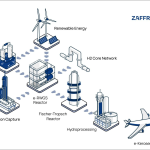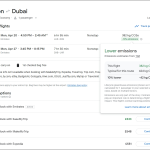Renewable fuel producer Neste has announced two major sustainable aviation fuel partnerships in Europe and the US. In France, Neste will work with port operator Compagnie Industrielle Maritime (CIM) to import blended product, supporting a government requirement that fuel companies include at least 1% SAF in supplies for commercial flights. The fuel will be shipped to the port of Le Havre, then pumped to airports by fuel distributors, via the TRAPIL pipeline. In California, Neste has just delivered 500,000 gallons of blended SAF to Los Angeles International Airport (LAX) for use on both domestic and international flights. The delivery was the biggest single shipment of SAF to LAX, one of the world’s busiest air transport hubs. Canada’s WestJet has also committed to using Neste’s SAF on flights from San Francisco to Calgary for a three-month period. Neste is acquiring a US-based business that collects and aggregates used cooking oil, currently the main feedstock used globally in the production of SAF.
The French partnership was cited by Neste and CIM as a strong example of the cross-industry collaboration needed to help decarbonise the air transport industry and to demonstrate the suitability of existing infrastructure to deliver the next-generation fuel.
Olivier Peyrin, CEO of NOVEN Group, CIM’s parent, said the company had invested heavily in infrastructure required to handle renewable fuels such as SAF. “CIM Le Havre Terminal is a unique hub for aviation fuel in north-western Europe, with its deep-sea berths and TRAPIL and CEPS pipeline connections,” he said. “We are strongly committed to supporting our customers and partners through the SAF deployment.”
Jonathan Wood, Neste’s VP Europe, Renewable Aviation, said: “Through SAF mandates and partnerships like this in France, we will together drive the increased use of SAF and help build momentum in tackling aviation’s emission reduction challenge.” Neste is increasing its global SAF production up to 15-fold from next year, upping its current global output of 100,000 tonnes per year to as much as 1.5 million tonnes through expansion of its Singapore and Rotterdam production facilities.
In the US, Neste has partnered with LAXFUEL Corporation to deliver more than 500,000 gallons of blended sustainable aviation fuel to LAX, currently ranked by aviation data group OAG as the world’s eighth busiest air transport hub. The delivery was the first ‘ready-made’ fuel blend supplied via the airport’s fuelling infrastructure.
LAXFUEL is a fuel storage and distribution group formed by a consortium of airlines which operate at LAX. It supplies its member airlines, as well as managing fuel infrastructure for other Californian airports.
Where previous, much smaller and infrequent supplies have been delivered to LAXFUEL by road, this shipment was delivered by barges, in volumes which illustrate the rapid growth in demand for SAF, particularly in California, one of the earliest and fastest-growing markets for the fuel.
The first SAF supplies at LAX were provided in 2016 to United Airlines, now one of the industry’s decarbonisation flagbearers, with investments not just in zero emission fuels and technologies, but also in five emerging SAF producers. As well as commitments by individual airlines, California has also attracted two major SAF procurement deals from the oneworld airline alliance, totalling 550 million gallons for use by member airlines operating from four of the state’s airports.
“Sustainable aviation fuel is the fastest, most effective means we have to reduce the greenhouse gas emissions from air travel,” said John Trozzo, Chairman of LAXFUEL Corporation. “We now have the means to supply this low-emission fuel in larger volumes not only to the airlines flying from LAX but also to other airports in the region serviced by the broader fuel infrastructure managed by LAXFUEL in California. This partnership with Neste proves that we have the capability to immediately implement this fuel as a low-carbon solution. It also provides a sound basis for scaling up future deliveries to airlines.”
Chris Cooper, President of Neste US, said: “Our company has been at the forefront of accelerating the availability of SAF and this achievement, together with LAXFUEL, shows how we are taking concrete steps towards a more sustainable future for aviation.”
As part of its production ramp up, Neste has been increasing its investment in specialist waste collection businesses, and subject to regulatory approvals, it will acquire the used cooking oil (UCO) collection and aggregation business, plus related assets, from US-based Crimson Renewable Energy Holdings. The deal includes shares in two related companies, SeQuential Environmental Services LLC and Pure LLC, and a used cooking oil processing plant in Salem, Oregon.
Once finalised, this deal will be Neste’s third acquisition of a feedstock-related company in the US, following the purchase in 2020 of Mahoney Environmental, which sources used oils from restaurants, hotels, sports stadiums and airports, and the acquisition last year of Agri Trading US, one of America’s biggest independent traders in renewable waste, residue fats and oils.
Neste’s President and CEO, Matti Lehmus, said the UCO acquisition from Crimson Renewable Energy would strengthen Neste’s presence and operations in the US and together with Mahoney Environmental, would form a nationwide collection and aggregation network for used cooking oils and fats.
The Neste-LAXFUEL deal coincides with a surge in new SAF commitments globally, including the introduction of Neste SAF on domestic flights by Japan’s largest airline, ANA.
Canada’s WestJet has also committed to using Neste SAF on 40 flights between San Francisco and Calgary over a three-month period, an initiative which is expected to cut greenhouse gas emissions by 186 tons. “We are thrilled that WestJet will be the first Canadian air carrier to operate a dedicated flight route using SAF,” said Angela Avery, the airline’s Executive VP and Chief People, Corporate and Sustainability Officer. “This is an integral step in decarbonising Canada’s aviation sector and WestJet is committed to working alongside our partners to reduce our environmental footprint as we aim to drive greater awareness for the importance of a SAF ecosystem in Canada.”
Photo: Los Angeles World Airports (Jacob Brosseau)












More News & Features
SAF One announces new investment and technology partners for Middle East SAF project
New initiative formed to accelerate SAF adoption and production in the Pacific Northwest
EcoCeres opens new Malaysia production facility as SAF ambition in Asia scales up
Aviation, shipping and fuel leaders convene in Rotterdam to accelerate sustainable fuels scale-up
EU SAF mandates will have to be revised, predicts French oil chief
Lessons learned from the collapse of Fulcrum BioEnergy